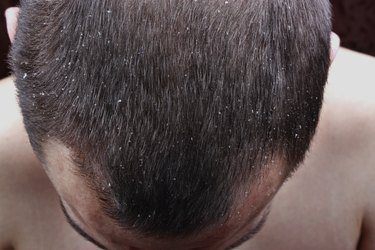
A dry, flaky scalp may result from dry skin, dandruff or a more serious autoimmune condition called psoriasis. Good habits, such as regularly moisturizing, shampooing, staying hydrated and getting enough essential fatty acids, can help keep your scalp from getting dry. Getting adequate amounts of certain vitamins may also support optimal scalp health.
Defining a Dry Scalp
Video of the Day
Dandruff occurs in approximately 3 percent of the U.S. population, reported Seattlepi.com in 2012. This condition also goes by the name seborrheic dermatitis and flares up when you're under stress, subjected to cold weather or a victim of fungal infection. Dandruff is usually characterized by flaking and dry, itchy patches of skin on an oily scalp. It's usually localized to the scalp and sometimes to the eyebrows, forehead, lips and other bodily folds.
Video of the Day
Psoriasis causes inflammation and scaling of the skin. Its pain, swelling and redness result from overactive skin cells that rise to the surface too quickly, resulting in patches of skin with silvery scales. The silvery hue distinguishes psoriasis from dandruff. Your scalp, along with knees, low back, palms and even your mouth, may be affected. Psoriasis may become so dry and tight that it cracks and bleeds, especially on the scalp. Burning, itching and soreness, as well as temporary hair loss, are other symptoms. Psoriasis can be managed, but not cured, as it is a long-lasting disease of the immune system.
Vitamin D
Topical vitamin D is used to treat psoriasis and may help prevent the cells from misfiring and rising to the surface too quickly. Some research, such as a 2013 review in the Journal of Dermatological Treatment, notes that vitamin D may be a successful treatment for psoriasis when taken orally. Discuss with your doctor proper dosage if you opt for a supplement. Food sources of vitamin D include fortified milk, salmon and eggs. Regular exposure to the sun also stimulates your body to produce this vitamin.
Vitamin B-12, A and C
Your scalp dryness may be a symptom of overall skin dryness. Vitamin B-12, found primarily in animal foods such as a meat, poultry, fish and dairy, helps promote moister skin. It can help keep the scalp from becoming overly dry and resulting dull hair color. Vitamins A and C encourage your scalp to produce natural oils through the sebaceous glands, creating a moister scalp and glossier hair.
Fatty Acids
Fatty acids, particularly omega-3s found in fatty fish, walnuts and flax, are important for well-hydrated skin and a healthy scalp. Consuming enough may help alleviate dandruff, psoriasis outbreaks and dry skin. A dry scalp may be a result of a fatty acid deficiency or of the inability of the body to process the fatty acids you do eat. Biotin, also known as B-7, helps with fatty acid metabolism. Get enough of this essential nutrient by consuming liver, yeast, fortified grains and eggs.
- National Institute of Arthritis and Musculoskeletal Disease: What Is Psoriasis?
- Seattlepi.com: Take a Natural Approach to Dandruff and Dry Scalp
- National Psoriasis Foundation: Vitamins and Supplements
- Journal of Dermatological Treatment: Oral Vitamin D, Still a Viable Treatment Option for Psoriasis.
- Health: 12 Ways to Get Your Daily Vitamin D
- American Academy of Dermatology: Scalp Psoriasis: Signs and Symptoms
- Trichological Society: Nutrition and Hair Health
- Daily Mail: How to Eat Your Way to Healthy Hair